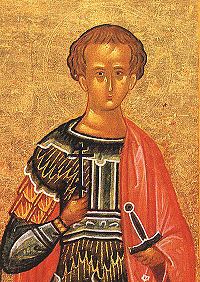Polyeuctus of Melitene
| Saint Polyeuctus | |
|---|---|
 |
|
| Died | January 10, 259 AD Melitene, Kingdom of Armenia |
| Venerated in | Eastern Orthodox Church, Roman Catholic Church |
| Feast | January 9 (Eastern Orthodox Church) February 13 (Catholic Church) |
| Patronage | Vows and treaty agreements |
Saint Polyeuctus (also Polyeuctes, Polyeuktos) of Melitene (died January 10, 259) is an ancient Roman saint. Christian tradition states that he was a wealthy Roman army officer who was martyred at Melitene, Armenia, under Valerian.
Symeon Metaphrastes writes that, moved by the zeal of his friend Saint Nearchus, Polyeuctus had openly converted to Christianity. "Enflamed with zeal, St Polyeuctus went to the city square, and tore up the edict of Decius which required everyone to worship idols. A few moments later, he met a procession carrying twelve idols through the streets of the city. He dashed the idols to the ground and trampled them underfoot."
He was tortured by the authorities and ignored the tears and protestations of his wife Paulina, his children, and his father-in-law. He was beheaded.
He was buried at Melitene, and a church was dedicated to him there. Christian tradition states that the parents of Euthymius the Great prayed for a son at the church of St. Polyeuctus in Melitene.[1]
A church was dedicated to him at Constantinople by Anicia Juliana in 524-527. The excavations undertaken in the 1960s revealed that, at the time of Justinian's ascension to the throne, the basilica was the largest in Constantinople and that it featured some remarkably ostentatious display of wealth, such as gilded reliefs of peacocks, as well as much oriental detail.
His feast day is February 13 in the Catholic calendar. In the Eastern Orthodox liturgics, his feast falls on January 9. His feast day was January 7 in the ancient Armenian calendars. Polyektus is the patron saint of vows and treaty agreements.[2]
...
Wikipedia
